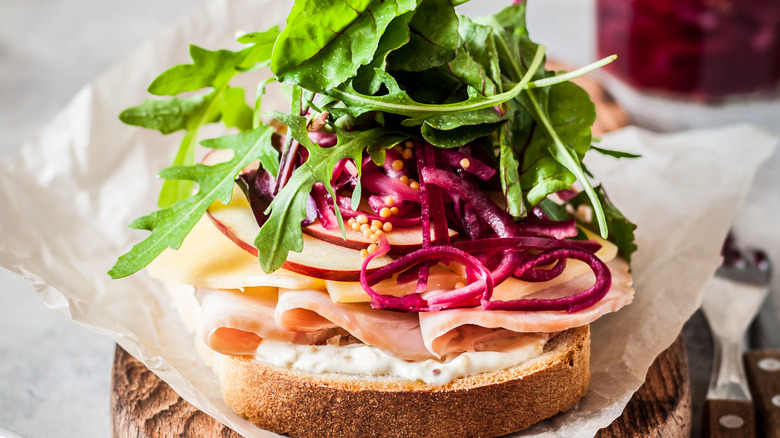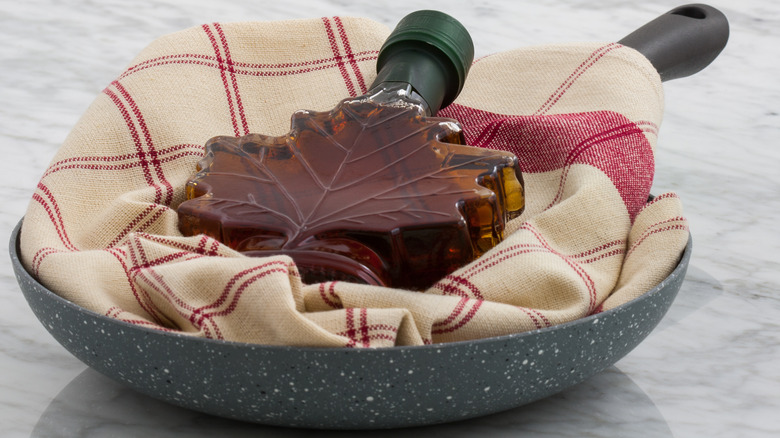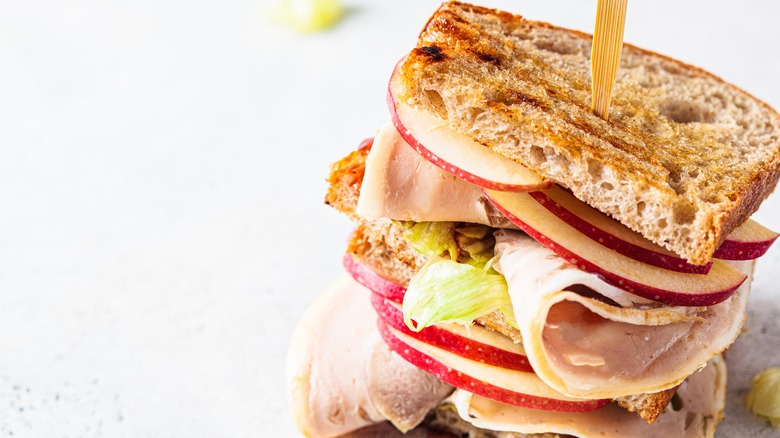Why Is It So Hard To Figure Out What's In A Vermonter Sandwich?
There's something to be said for well-defined sandwiches — you always know what you're getting when you order a BLT, Reuben, or Monte Cristo, and even a turkey club has pretty strict parameters (make sure it has three slices of bread). However, some sandwich classics aren't so easily boxed in and are a little more open to interpretation, like the Vermonter.
According to USA Today 10 Best, a Vermonter is typically a turkey- or ham-based sandwich that includes Vermont-made cheese, mustard, and sliced fresh apples. Dreamed up by chef Jason Maroney at Sweetwaters American Bistro in Burlington (per Sandwich Sunday), the handheld was designed to show off some top-notch local ingredients. With a long history of dairy farming, the cheese was a no-brainer; Vermont is home to Cabot Creamery, which is famous for several award-winning cheeses. But you can't just make a sandwich with turkey and cheese and claim it's something special, so chef Maroney had to add a unique twist — fresh apples, which grow abundantly in the Green Mountain State. "[The Vermonter] was something we could add to provide a different element. Not many people do things with apples," he said (according to Cabbages and Kings).
Sweetwaters closed after 41 years in 2022 (per WCAX), but the sandwich legacy endures, and you can find a Vermonter at delis all around the state and throughout New England. Nobody can quite agree on what exactly makes a proper Vermonter.
Vermont products have rules
Vermont is pretty particular about its food products, despite the variations of its namesake sandwich. For starters, The State of Vermont's governor outlined strict rules about labeling local products, defined in Act 129, which says that any food with a "made in Vermont," "local to Vermont," or "locally grown" claim is required to originate in Vermont or within 30 miles of the point of sale, respectively. For example, Cabot cheese company sources milk within Vermont state lines.
The rules get even more specific regarding maple syrup, one of the state's most closely guarded and lucrative products and often referred to as liquid gold. The state adopted statutes defining the laws for its production to protect its investment and prevent any interloping artificial syrups from claiming to be Vermont-made. Per the Vermont State Legislature, "'Maple syrup' means pure maple syrup, which is the liquid derived by concentration and heat treatment of the sap of the maple tree (Acer). Maple syrup shall not be processed in any manner which adds or removes naturally occurring soluble materials."
One other weird Vermont food law was passed in 1999, which says that those serving apple pie should "make a 'good faith effort' to serve it with ice cream, cold milk, or 'a slice of cheddar cheese weighing a minimum of 1/2 ounce,'" (per Atlas Obscura).
What's between the bread?
When it comes to the state sandwich, however, there are no hard and fast rules. Do a little internet sleuthing, and you'll come up with many variations on the staple. For example, Butternut Mountain Farm in Morrisville, Vermont, makes sure to include maple for a little extra authenticity with its version made with turkey, Vermont cheddar, sliced apple, and maple-herb compound butter plus maple quick-pickled red onions. The Woodstock Farmers Market, which calls its version Moonlight in Vermont, was voted one of the best Vermonter sandwiches in the state by USA Today. This version keeps it simple: turkey, sweet apple slices, mayo, and lettuce on sourdough. And August First in downtown Burlington is taking over the tradition from Sweetwaters with its version of the sandwich made with smoked turkey, cheddar, apple chutney, red onion, and cranberry mayonnaise on country French bread.
The bottom line is that, unlike many of Vermont's foods, a Vermonter is more of a state-of-mind sandwich than a recipe with a strict set of rules. The most crucial ingredient is apples, and the more Vermont products you can source for your handheld, the more authentic it will turn out. So far, there are no laws dictating how the sandwich is made so the Vermont State Police won't be raiding your lunchbox any time soon, but you never know if or when that could change, so it's best to keep it traditional (and always serve it with a local microbrew)!


